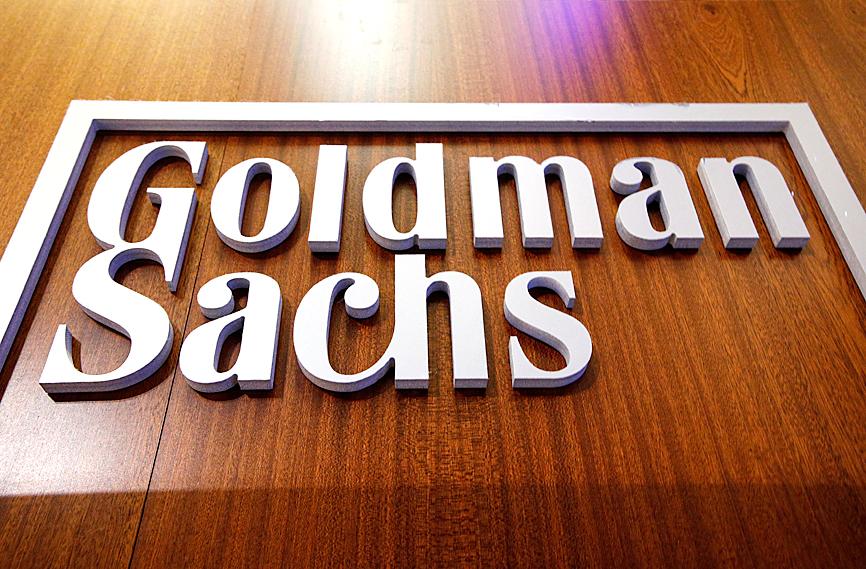Profit at Goldman Sachs Group Inc jumped amid a merger boom, while JPMorgan Chase & Co’s results were boosted by the impact of the recovering US economy on loan quality, according to results released on Tuesday.
The financial heavyweights reported soaring second-quarter profit compared with the previous year, when large banks set aside massive reserves in case clients defaulted amid the COVID-19 downturn.
However, widespread access to COVID-19 vaccines and the accelerating reopening of the US economy have put those days in the rearview mirror.

Photo: Reuters
At JPMorgan, which has a significant retail operation in addition to investment banking, combined debit and credit card spending was up 45 percent from the previous year and more than one-fifth higher than in the pre-pandemic 2019’s second quarter, JPMorgan chief executive Jamie Dimon said.
He highlighted “exceptionally strong” consumer and business balance sheets.
However, the much sunnier outlook includes some continued question marks surrounding the course of the pandemic.
The rapid spread of the Delta variant of SARS-CoV-2 is one factor creating “elevated uncertainty” about the bank’s outlook for “a very robust recovery,” JPMorgan chief financial officer Jeremy Barnum said.
Goldman Sachs chief executive David Solomon also cited the pandemic as a potential source of economic trouble, noting this month’s tightening of restrictions in Hong Kong and Australia.
Vaccine coverage “is not consistent across communities and nations, including parts of the United States,” Solomon said on a conference call with analysts. “Widespread vaccine distribution and high vaccine rates are critical to open and thriving economies.”
The biggest US bank by assets, JPMorgan began the earnings season for the sector, reporting that profit more than doubled to US$11.9 billion in the second quarter, including a boost from US$3 billion that had been set aside as reserves.
JPMorgan had budgeted US$8.9 billion for bad loans in the second quarter last year, but it reported just US$734 million in charge-offs for defaults in the second quarter this year.
However, revenue for the period fell 8 percent to US$30.5 billion, as the bank’s trading business saw much less activity compared with the previous year.
Bank executives also expressed little optimism about loan growth, given the healthy state of US consumer finances following government stimulus programs.
Loan growth is going to be “a little bit of a slog through the rest of this year,” Barnum told reporters.
While “unusually high” pay rates for credit cards are “a healthy thing for consumers, it does create a bit of a headwind for our loan growth,” he said.
JPMorgan posted record global investment banking fees of US$3.6 billion in the second quarter, driven by heavy merger and acquisition activity.
At Goldman, profit came in at US$5.3 billion in the second quarter, compared with US$197 million the previous year, when results were dented not only by provisions for bad loans, but from elevated legal costs.
Revenue was US$15.4 billion, a 16 percent increase and the second-highest quarterly revenue in the firm’s history after the first three months of this year.
Goldman’s results reflected a jump in financial advisory revenue due to a rise in completed mergers and acquisitions.

South Korea’s equity benchmark yesterday crossed a new milestone just a month after surpassing the once-unthinkable 5,000 mark as surging global memory demand powers the country’s biggest chipmakers. The KOSPI advanced as much as 2.6 percent to a record 6,123, with Samsung Electronics Co and SK Hynix Inc each gaining more than 2 percent. With the benchmark now up 45 percent this year, South Korea’s stock market capitalization has also moved past France’s, following last month’s overtaking of Germany’s. Long overlooked by foreign funds, despite being undervalued, South Korean stocks have now emerged as clear winners in the global market. The so-called “artificial intelligence

‘SEISMIC SHIFT’: The researcher forecast there would be about 1.1 billion mobile shipments this year, down from 1.26 billion the prior year and erasing years of gains The global smartphone market is expected to contract 12.9 percent this year due to the unprecedented memorychip shortage, marking “a crisis like no other,” researcher International Data Corp (IDC) said. The new forecast, a dramatic revision down from earlier estimates, gives the latest accounting of the ongoing memory crunch that is affecting every corner of the electronics industry. The demand for advanced memory to power artificial intelligence (AI) tasks has drained global supply until well into next year and jeopardizes the business model of many smartphone makers. IDC forecast about 1.1 billion mobile shipments this year, down from 1.26 billion the prior

Chinese artificial intelligence (AI) start-up DeepSeek’s (深度求索) latest AI model, set to be released as soon as next week, was trained on Nvidia Corp’s most advanced AI chip, the Blackwell, a senior official of US President Donald Trump’s administration said on Monday, in what could represent a violation of US export controls. The US believes DeepSeek will remove the technical indicators that might reveal its use of American AI chips, the official said, adding that the Blackwells are likely clustered at its data center in Inner Mongolia, an autonomous region of China. The person declined to say how the US government received

People stand in a Pokemon store in Tokyo on Thursday. One of the world highest-grossing franchises is celebrated its 30th anniversary yesterday.